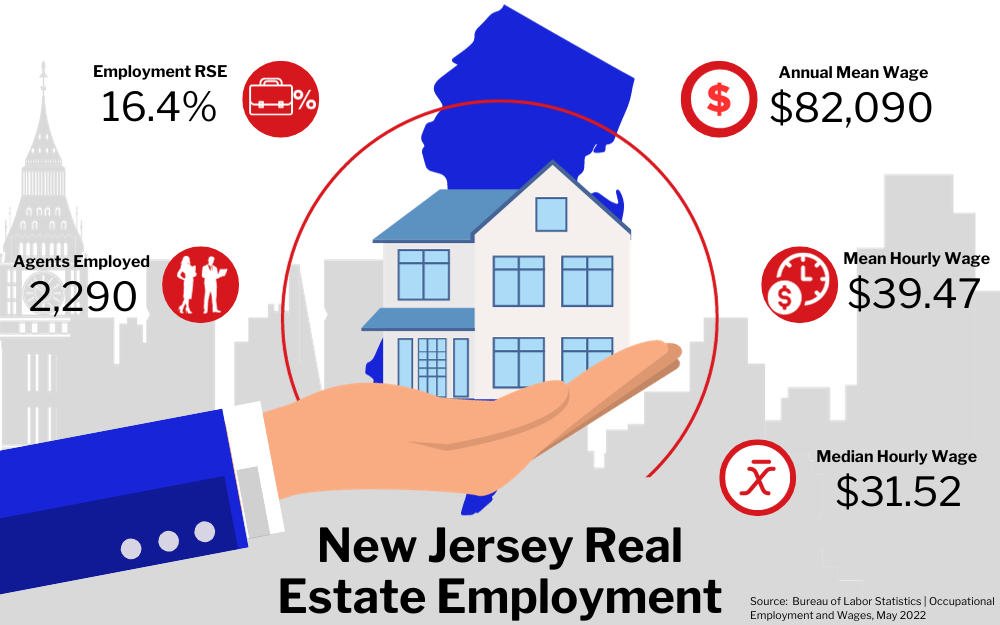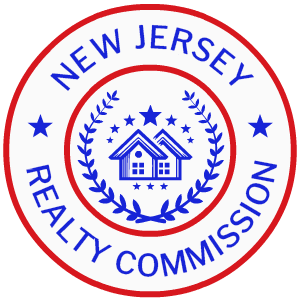
The process of obtaining a real estate license in New Jersey is overseen by the New Jersey Real Estate Commission (NJREC) which operates under the jurisdiction of the New Jersey Department of Banking and Insurance (NJDOBI).1,2
The NJREC’s primary objective is to ensure that all active real estate agents meet the qualifications to uphold business practices.
NJDOBI: New Jersey Department of Banking and Insurance
Mailing Address:
New Jersey Department of Real Estate1
PO Box 328
Trenton, NJ 08625-0328
Phone: (609) 292-7272
Email: [email protected]
NJ Real Estate License
Here are some important points to consider when acquiring a real estate license in New Jersey;
- Applicants must be 18 years old and possess a high school diploma or an equivalent qualification
- First-time applicants are required to complete 75 hours of pre-licensing education at an accredited educational institution before they can apply for their license
- All applicants must successfully pass the two-part New Jersey Real Estate Exam, which is administered by PSI Exams
- Upon receiving their initial license, new salesperson licensees must affiliate themselves with a sponsoring broker
- It is mandated for real estate licenses to be renewed every two years accompanied by completion of continuing education requirements
- It’s worth noting that New Jersey does not offer reciprocal licensing agreements with any state
Foundational Criteria For Gaining a Real Estate License
The New Jersey Real Estate Commission (NJREC) has set basic requirements that every individual aspiring to be a real estate licensee must meet.3 These requirements ensure that applicants are of age, have met educational prerequisites, and have no criminal record that could hinder their ability to work in the real estate industry safely and ethically.
To be eligible for a real estate license in New Jersey you must fulfill the following requirements;
- Should be 18 years old
- Have obtained a high school diploma or an equivalent qualification
- Undergo a fingerprint-based criminal background check
Necessary Age and Elementary Education Standards
According to NJREC regulations, anyone applying for a real estate license must be at least 18 years old when submitting their application.3 This age requirement is in place to make sure that potential agents have the maturity and life experience when dealing with clients.
If you are under 18 but meet all criteria you can still complete the education and take the state exam. However, your license will remain inactive until you turn 18.
While formal post-secondary education is not mandatory in New Jersey, applicants are required to have at least a high school level education.3 Having a diploma or GED serves as evidence of your literacy and numeracy skills required for understanding real estate concepts and fulfilling job responsibilities.
When applying for a license you will need to provide transcripts as proof of your educational background.
Moreover, many real estate schools may require applicants to hold a high school diploma before enrolling in licensing courses. It’s advisable to check with your chosen real estate school whether they require the submission of your diploma or transcripts during the enrollment process.
Having the capabilities to handle college-level coursework can also contribute to your success, in real estate classes.
Pre-Licensing Course Hours Required (Can I Take Free Real Estate Classes Online?)
To be eligible for the New Jersey real estate exam, you need to fulfill the mandatory requirement of completing a number of pre-licensing education hours that have been approved by the New Jersey Real Estate Commission.
The commission mandates that applicants must complete 75 hours of pre-licensing education from an authorized provider in order to qualify for the state licensing exam.3
These 75 hours cover knowledge that every real estate agent should possess. The topics covered include:
- Property ownership
- Land use controls and regulations
- Valuation and market analysis
- Financing
- General principles of agency
- Property disclosures
- Contracts
- Leasing and property management
- Transfer of title
- Practice of real estate
- Real estate calculations
- Duties and powers of the NJREC
- Licensing requirements
- Statutes and rules governing licensee activities
- NJ Real Estate Sales Full Disclosure Act
- NJ Law Against Discrimination
- Real Estate Guaranty Fund
- NJ Real Estate Timeshare Act
You can satisfy the education requirement through:
- In-person classroom instruction at an approved real estate school in New Jersey. This includes live online courses.
- Online on-demand courses from an NJREC-approved provider. Learn at your own pace.
The common route involves completing the 75-hour course either in person or online through a provider approved by the NJREC.
While there is an abundance of free real estate courses available online, it’s important to note that these free courses do not meet the licensing education requirements set by New Jersey. Only courses completed through a school authorized by NJREC will fulfill the criteria.
To ensure you are choosing an approved real estate school you can refer to the New Jersey Real Estate Commission’s list of Approved Real Estate Schools.4 Avoid schools that are not on the approved list.
Expenses for Pre-Licensing Education in Real Estate School
As previously mentioned, although there are free real estate courses that can be found online, it is essential to complete 75 hours of licensing education from NJREC-Approved Real Estate School in order to meet the eligibility criteria for taking the state licensing exam.4
On average, the cost of tuition for the 75 hours of licensing courses can range from $200 to $500 or more. The expenses vary based on factors like the format of delivery (online or in-person), the chosen provider, and any additional components such as exam preparation guarantees.
To find a balance between your budget and other considerations like delivery methods, study resources, exam pass assurances, and technology requirements it’s advisable to explore different approved real estate schools.

Additionally, when selecting a school, consider whether they offer exam preparation materials like sample tests and retake guarantees in case you don’t pass the licensing exam on your attempt. On average these prep courses cost around $50 to $100.
Some real estate schools might even provide discounts if you bundle the pre-course with their exam prep classes or materials. To ensure you get the value for your money, compare tuition costs across three to five approved schools before making a decision.
Fundamental Real Estate Background Examination (Fingerprint Location Information)
To obtain a New Jersey Real Estate license, all candidates are required to undergo fingerprinting, known as Live Scan, as part of the application process. The State of New Jersey has partnered with IdentoGo/IDEMIA,5 as their vendor, for this service.
IDEMIA has established locations throughout the state and also operates mobile units to ease access.
To ensure that candidates do not encounter any issues related to the expiration of the one-year eligibility for licensure and to submit applications in a timely manner, it is crucial for applicants to promptly undergo the fingerprinting process once they have successfully passed the State examination.
To schedule a fingerprinting appointment, visit the IDEMIA website.6 Appointments can be booked online or over the phone.
Bring the following items to your fingerprinting appointment:
- Completed New Jersey Universal Fingerprint Form:7 This must be filled out beforehand. The blank form can also be downloaded from the IDEMIA website.
- Valid photo ID: Acceptable IDs include a driver’s license, passport, or other government-issued identification containing your name, address, and date of birth.
- $66.05 fee paid directly to IDEMIA: This mandatory fee covers the criminal history record check. IDEMIA accepts Visa, MasterCard, American Express, Discover, debit cards, prepaid debit cards, and ACH payments.
Cash is not accepted.
If you live, work, or attend school in New Jersey, you must complete fingerprinting in person at an IDEMIA location in the state. If you are not located in New Jersey or within 10 miles of the border, contact the NJREC Licensing Services Bureau for instructions on fulfilling this requirement.8
At your appointment, you will provide fingerprints either by traditional ink or electronic scan. Fingerprint cards will be submitted to the New Jersey State Police and FBI databases for matching.
It generally takes 3 to 6 weeks to receive your background check results.
Review your report for any discrepancies and dispute any inaccurate information immediately. Submit copies of your completed New Jersey Universal Fingerprint Form and IDEMIA payment receipt when filing your real estate license application.7
Passing this criminal history record check is required for the NJREC to approve licensure. While certain criminal convictions may raise questions, having a record does not automatically disqualify you from getting a New Jersey real estate license.
What’s more, in case you have a past record, you will be given an opportunity to submit a full, written explanation which the commission takes into account during review.
To avoid processing delays, the NJREC recommends completing the fingerprinting process right after passing your licensing exam. Schedule an appointment and fulfill this requirement well before submitting your license application.
References
1New Jersey Department of Banking and Insurance. (2021). New Jersey Real Estate Commission. State of New Jersey New Jersey Department of Banking and Insurance. Retrieved November 13, 2023, from <https://www.nj.gov/dobi/division_rec/index.htm>
2New Jersey Department of Banking and Insurance. (2023). SPOTLIGHT. State of New Jersey New Jersey Department of Banking and Insurance. Retrieved November 13, 2023, from <https://nj.gov/dobi/index.html>
3New Jersey Department of Banking and Insurance. (2021). Requirements for Licensure as a NJ Real Estate Salesperson or Broker. State of New Jersey New Jersey Department of Banking and Insurance. Retrieved November 13, 2023, from <https://www.nj.gov/dobi/division_rec/licensing/reclicrequire.htm>
4New Jersey Department of Banking and Insurance. (2023, November 13). – Licensed Schools as of 11/13/2023 -. New Jersey Department of Banking and Insurance. Retrieved November 13, 2023, from <https://www.nj.gov/dobi/division_rec/licensing/schlist.html>
5IdentoGO®. (2017). IdentoGO® Homepage. IdentoGO®. Retrieved November 13, 2023, from <https://uenroll.identogo.com/>
6IdentoGo by IDEMIA. (2023). New Jersey. IdentoGo by IDEMIA. Retrieved November 13, 2023, from <https://www.identogo.com/locations/new-jersey>
7State of New Jersey. (2023). New Jersey Universal Fingerprint Form. IdentGo by IDEMIA. Retrieved November 13, 2023, from <https://www.nj.gov/dobi/division_rec/licensing/forms/univform_sales_051719_v1.pdf>
8State of New Jersey, Department of Banking and Insurance. (2023). Online Licensing Services Login. Real Estate Commission. Retrieved November 13, 2023, from <https://www.nj.gov/dobi/division_rec/licensing/online_Instructions/>
